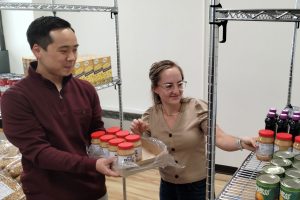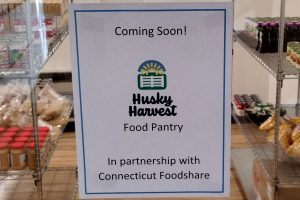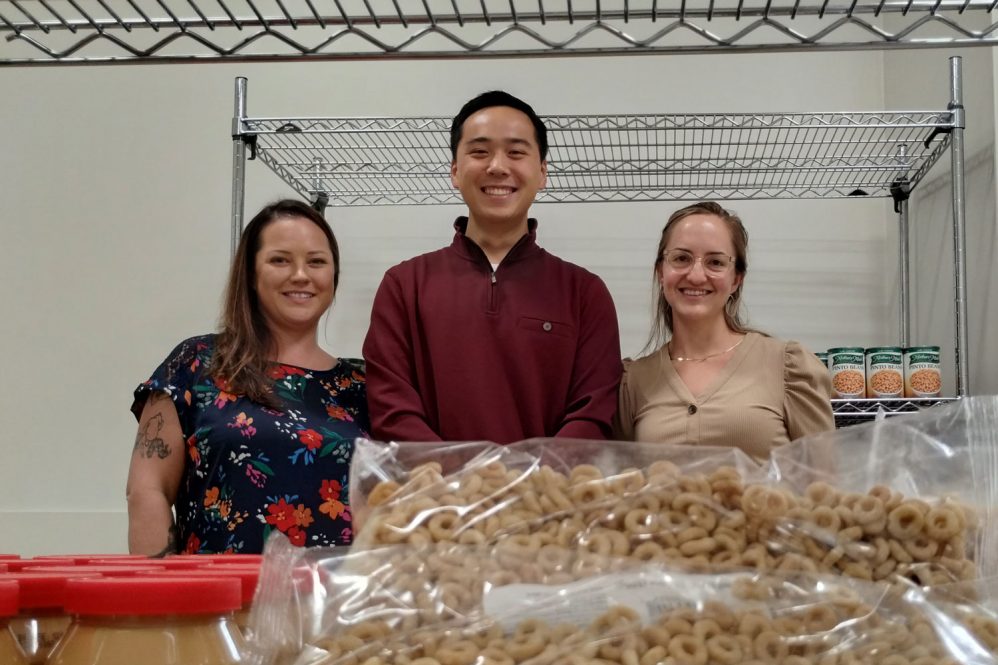UConn Health is joining other UConn campuses in establishing a Husky Harvest food pantry for students and staff.
While the Husky Harvest in Storrs got a visit from UConn basketball star Paige Bueckers Sept. 25, Suzanne Tate, director of curricular affairs in the UConn School of Medicine, already had started stocking the shelves at the Husky Harvest pantry in Farmington that will open in the coming weeks.
We intend it to be inviting. We want to make sure that it’s for the community and by the community. — Suzanne Tate
The idea rose from a survey of medical students last year, to which 30% of respondents reported experiencing food insecurity in the past year.
“We wanted to see what we could do to address that, to make sure that we’re not just addressing the student’s academic needs, but we want to be wholly supportive, in a holistic sense, of their well-being,” Tate says. “It seemed like one of the most tangible things that we could address with them. So we started looking into it and we found that all the other campuses either had a food pantry or were in the process of opening one.”
Tate and Dr. Melissa Held, senior associate dean for medical student education, are overseeing UConn Health’s Husky Harvest, with the vision of turning operations over to a motivated group of students. The pantry will serve both students and staff.
“This intervention has been long overdue for our school,” Held says. “I’ve wanted to create a food pantry here for the past few years. Professional school is stressful — financial and food insecurity challenges only add to that stress. We hope that the food pantry will provide a place where anyone can come, without stigma, to get what they need to help support them in their endeavors to be successful.”

The student co-directors are MD/Ph.D. candidate Caroline Guild and MD/MPH candidate Dean Kim.
“I’m really a believer in food as medicine,” Kim says. “I’m really passionate about food insecurity and nutrition policy. Working as a medical provider, I want to make sure that I’m able to offer good recommendations and services to make sure that people can have adequate nutrition.”
Guild says a separate survey of MD/Ph.D. candidates also revealed a surprising degree of food insecurity within her cohort.
“Providing access to adequate nutrition to all of our peers, and faculty and staff, is only going to make our workplace better, make people able to focus on what they’re doing,” Guild says. “And also, I think it’s a great place to start at home and learn about how this works so that we can, when we are health care providers, direct our patients towards these resources in the future.”
Together they’ll staff the pantry, maintain inventory, draw up the playbook to get the program up and running, and, as it grows, recruit and schedule additional volunteers.
“I think that there’s a lot of opportunity for them to really make it their own,” Tate says. “No one knows better than them what the students need, and so part of their job is going to be to work with their colleagues to figure out, ‘All right, we have this, how can we make it grow to address the needs of the student body and the community as a whole?’”
It will be food items to start, with the idea of eventually accommodating other needs such as toiletries, hygiene products, and possibly clothing.

The pantry is located in AM016, on the main floor of the academic building, around the corner from the wellness center. The first delivery to stock the shelves came by way of Connecticut Foodshare, more than 500 pounds of nonperishables.
Initial hours are Mondays 4:30 to 5:30 p.m., Wednesdays noon to 1 p.m., and Fridays 3:30 to 5:30 p.m., open to anyone with a UConn ID badge.
“We want to make it something where there’s no stigma,” Tate says. “We want to make it so that it is accessible to anyone who has any barriers, any sort of restriction to having access to food. We intend it to be inviting. We want to make sure that it’s for the community and by the community.”
The plan is for an official grand opening Oct. 18, followed by expanded hours. By then, two refrigerators and a freezer will be in place to enable offerings of fresh produce, dairy, meat, and frozen goods.
“We had an anonymous donor through the UConn Foundation give us $10,000 for startup,” Tate says. “And the Neag Foundation gave every branch, including us, even though we weren’t open yet, $12,000 in startup funds specifically for groceries.”
Those wishing to help sustain Husky Harvest at UConn Health can make monetary contributions through the UConn Foundation. Tate says there also will be boxes to accept food donations, and there already is a designated Amazon wish list.



